Going for good
The Mariners are a good team.
It's the first thing Jerry Dipoto told us this offseason, and it's the line he returned to throughout.
"We have a good team.”
See?
Good is subjective, of course, but recent history would seem to agree. The last three seasons, the post-"retool" era, the Mariners went 263-223 -- the 11th best record in MLB. Their run differential ranked seventh at +253. Their batting and pitching fWAR each ranked ninth. That's good.
But good is not always good enough. The Mariners only made the playoffs once in those three years. Dipoto acknowledged this back in September.
We’re just having a tough time figuring out how to climb the wall from a good team to a very good team or a great team. That’s going to be our challenge this offseason.”
Have they met the challenge? We'll find out in a few months.
2025 projection
Most of the league is "good."
There are two teams (the Dodgers and Braves) projected to win 90+ games, and there are 18 teams projected to win between 81 and 88 games. According to Fangraphs, 11 teams have better than 50% odds to make the playoffs, and 20 teams have better than 25% odds. The Mariners are projected to win 85 games, and they have the best odds to win the AL West at 35.2% (the first time the Mariners have been projected to win the division on Opening Day since Fangraphs began recording in 2016). This chart from Thomas Nestico shows how close the American League is, with no team projected to win more than 86 games:
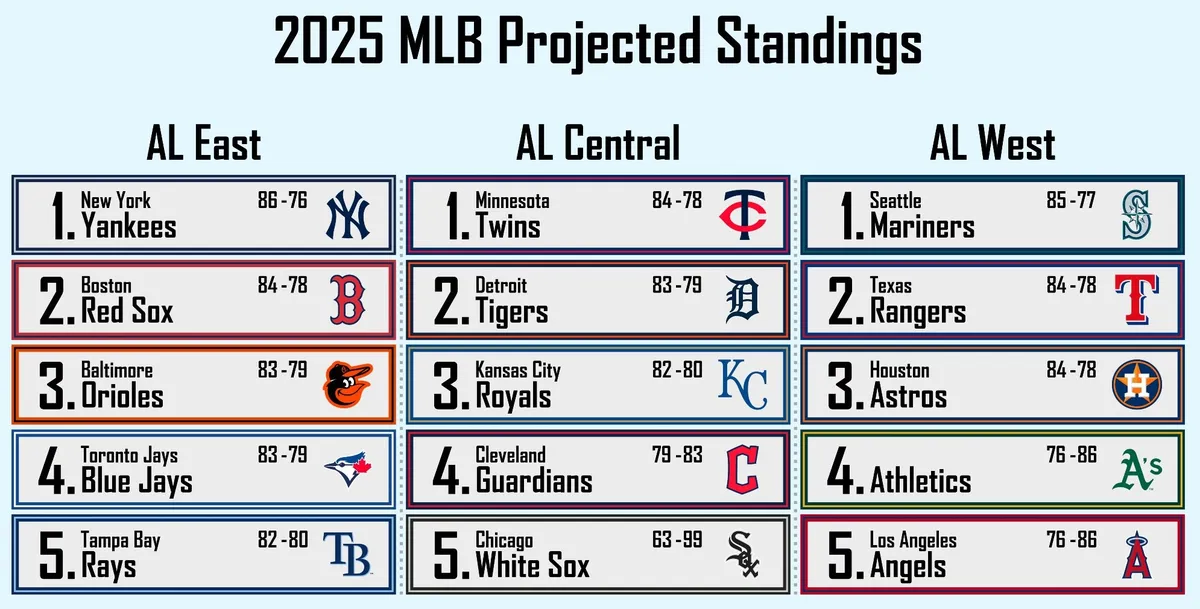
The Mariners are projected for the sixth most fWAR in MLB by ZiPS depth charts. The position player group is projected for 29.7 fWAR (10th), and the pitching staff is projected for 17.9 fWAR (7th). The Mariners are one of four teams to rank in the top 10 for both, after the Dodgers, Braves and Yankees.
The chart below shows the gap between the third and 13th projected teams is only a few decimals. Note that I pulled this data from Fangraphs on March 24.
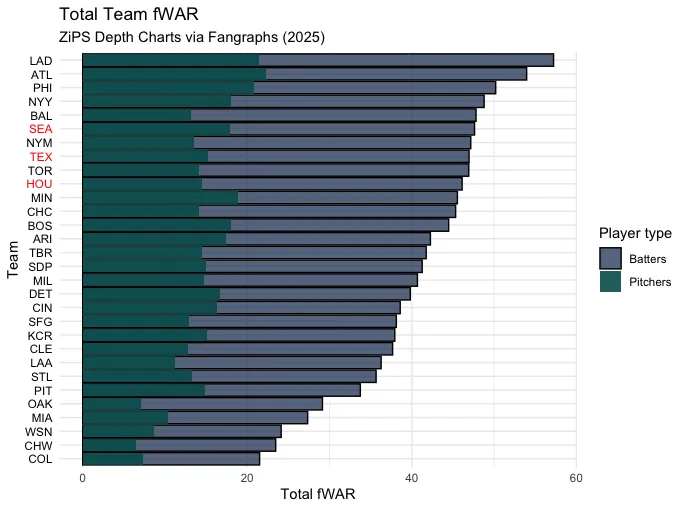
I don't think I need to talk too much about the pitching staff. It's good. It's very good. I'm not sure it's the best ever, as some have said, but it's certainly among the best in the league. I assume they will be as successful as they are healthy.
The position player group, particularly the offense, is what people are concerned with. Again, Mariners batters are projected for the 10th most fWAR. The actual "offense" is projected for the sixth most value, while the defense is projected in the bottom five.
Here's the distribution of fWAR by playing time when compared to the division.
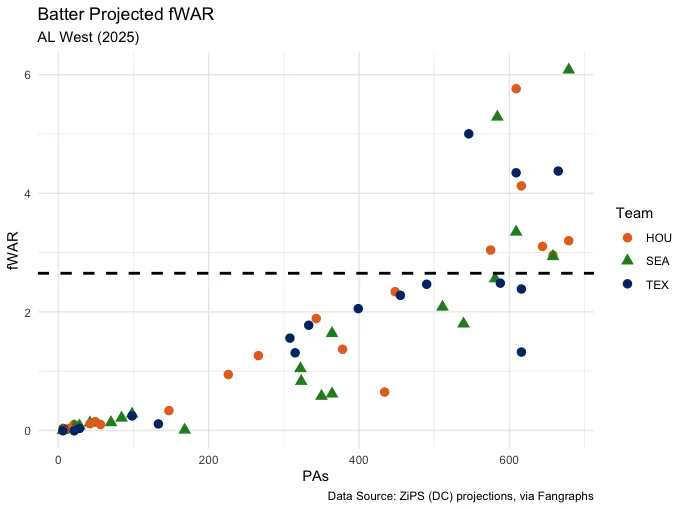
The Mariners have the best batter in the division (Julio) and the third best (Cal Raleigh). Julio and Cal are the sixth and 12th top projected batters in MLB. The Mariners next highest projected batters are J.P. Crawford, Randy Arozarena, and Victor Robles.
The Astros have six batters projected for 3+ fWAR, the Mariners have four, and the Rangers have three.
The Mariners are projected to give more than 300 plate appearances to four players at 1 fWAR or less (Ryan Bliss, Mitch Garver, Donovan Solano, and Rowdy Tellez). They have seven at 2 fWAR or less.
The Mariners are good. They have one of the best pitching staffs in the league, and they have a competitive position player group. Few teams appear as well rounded on paper. The analysis above shows that an empirically designed and independent system can look at the Mariners roster, compare it to the rest of the league, and conclude that they are ... good.
But the Mariners aren't more than good -- they aren't very good, they aren't great. Their odds are technically higher than their competitors but only by a few decimal points. They brought back nearly the same team as the one that fell just short in 2024, and they're projected to have nearly the same season again. The 2025 Mariners remain within the "coin flip" tier, and that's concerning, given the last decade of mostly losing coin flips.
Jerry Dipoto's decennial
The Mariners are better now.
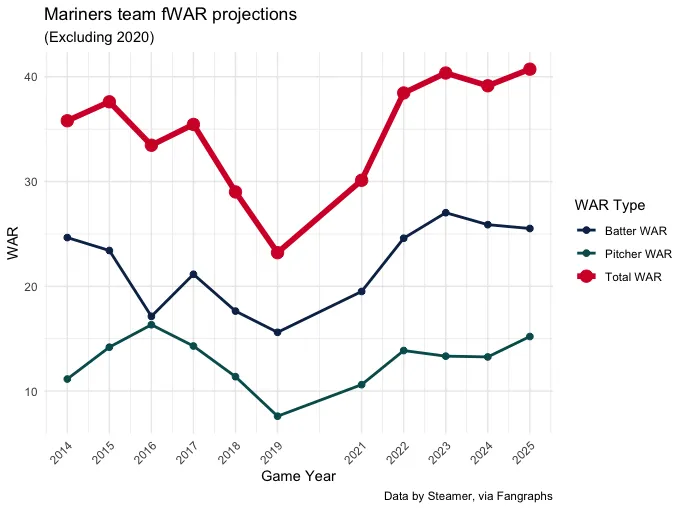
When the Mariners signed Robinson Canó in 2014, the team (especially the offense) improved. And when they signed Nelson Cruz a year later, the projections showed the Mariners were finally "good."
On the field, Canó and Cruz were instantly productive, Kyle Seager began his prime, Félix continued to dominate, and a few useful players (like Seth Smith and Hisashi Iwakuma) cropped up here and there. But the "supplementary" roster was filled by Jack Zduriencik's prospect system and veterans from outside the org like Corey Hart, Austin Jackson, and Rickie Weeks Jr. It didn't work out. The Mariners ranked 18th in batting fWAR and 23rd in pitching fWAR in 2014-2015.
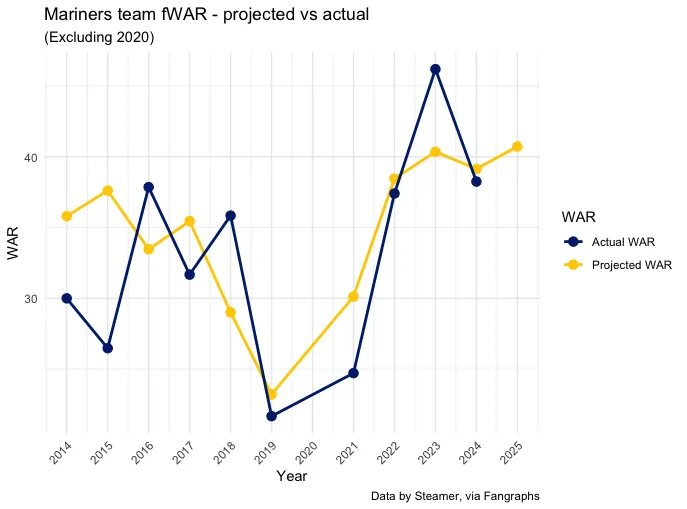
The gap between the projections and the actuals both years led to Zduriencik's dismissal. The teams he built were good on paper, but they were bad on the field, despite impressive contributions from a few. The 2014 Mariners managed to beat their peripherals and win 88 games, but the 2015 team couldn't keep that ball in the air, and the org changed leadership.
Dipoto was hired before the 2016 season. He leaned heavily on Zduriencik's core in his first two years. Canó, Cruz and Seager continued to put up massive numbers, others (like Mike Zunino) were good at times, and Dipoto later brought in a productive Jean Segura. The Mariners in 2016-2017 were the second most productive offense in MLB (105 wRC+), and finished eighth in batter fWAR.
But Félix was no longer effective and throwing much less. Iwakuma helped prop up the 2016 staff but was out of the league by May the next year. James Paxton was very good, but Taijuan Walker wasn't, and Danny Hultzen was gone. The pitching was bad, the defense behind it was worse, and the Mariners weren't quite enough once again, as the Astros won the World Series.
The last gasp for this group came in 2018. Dipoto brought back the Zduriencik core and remade the rest of the roster in his famous Trader Jerry transacting surge. But they weren't the moves you'd expect from a team with three historically great Mariners (and the carcass of another). Bumping up against the team's self imposed payroll limit (which reached 10th in MLB at its peak), and facing a bad free agency class (where Eric Hosmer took home the purse), and with only the league's worst farm system to trade from, Dipoto looked for value deals and value players. He brought in Mitch Haniger and Marco Gonzales and Ryon Healy and Dee Strange-Gordon and Mike Leake and Wade LeBlanc and more. He even brought back Ichiro. But the team failed to lure MLB's best deal of all, who chose a division rival, and the team's projections slumped.
Still, the 2018 Mariners were better -- much better -- for a while. On July 1, 2018, the Mariners were effectively tied for first place in the AL West and two games shy of the best record in MLB. They were on pace for 103 wins halfway through the season. For reference, the 2024 Mariners were on pace for 95 wins when they began their collapse on June 18.
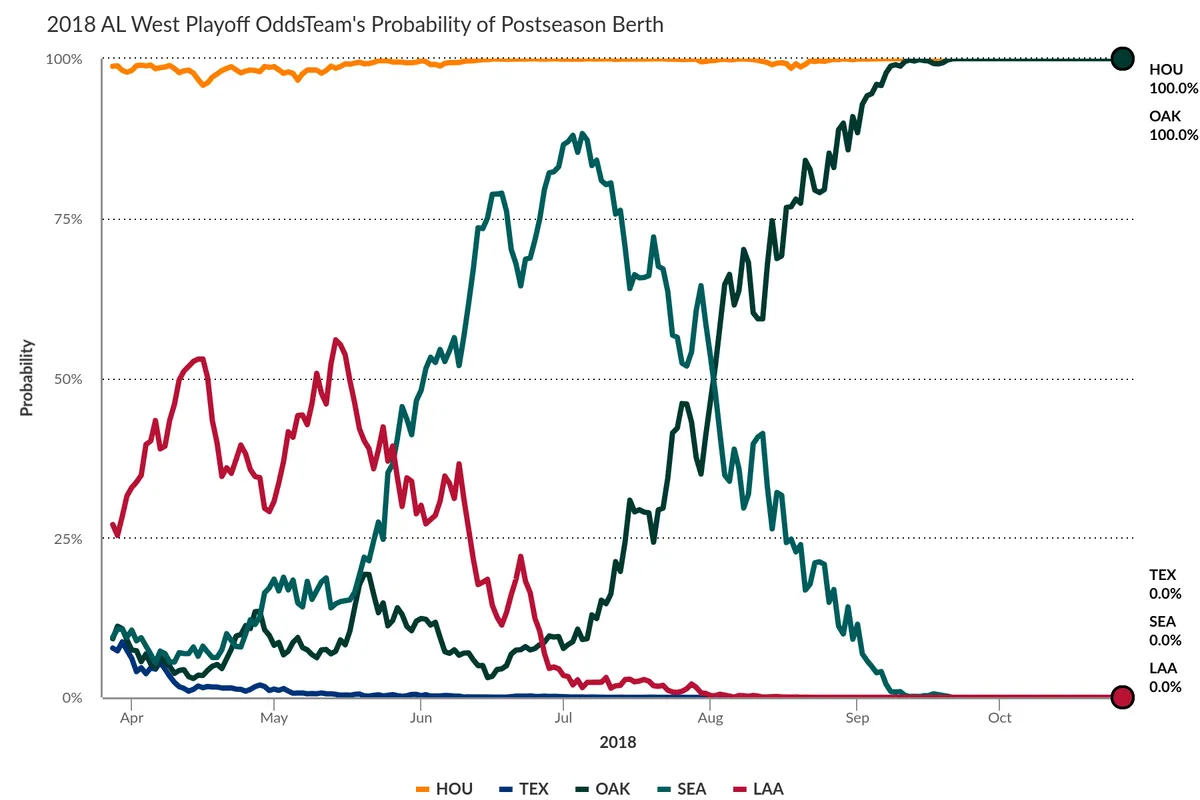
But the 2018 Mariners were over performing. They were a roughly average team playing 10 games above their pythag win total. And when Canó took an 80-game suspension, the momentum petered off. The Mariners were quickly paced by the truly great teams in their division and finished with 89 wins, well short of the playoffs.
Then the Mariners tanked. On the other side was Julio.
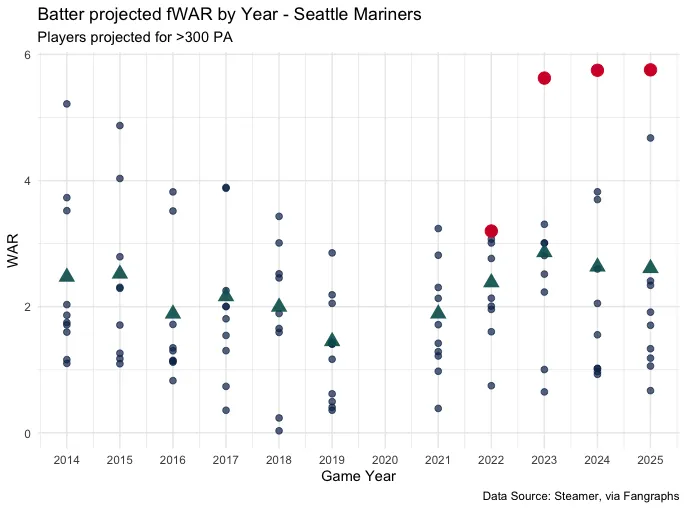
Julio's projections the last three years are the highest the Mariners have had since Steamer turned on. He and Cal are perhaps the org's most valuable batting duo of the last 20+ years. In their first three (full) seasons, Julio and Cal put up 29.3 fWAR, while Canó and Cruz put up 28 fWAR. In other words, the Mariners successfully replaced their highest-level producers through the "retool," creating the requisite talent ceiling to be "good" once again.
But the Julio-era has been a mixed bag.
- The 2021 Mariners (pre-Julio) weren't good on paper or on the field, but the Fun Differential squad won 90 games, nearly squeaking into the playoffs.
- The 2022 Mariners were good on paper and on the field, and they ended the drought.
- The 2023 Mariners were good on paper, and even better on the field, finishing fourth in pitching fWAR and sixth in batting fWAR. But it was a hot-and-cold team, prone to self-defeating stretches, and they missed the playoffs by a game.
- The 2024 Mariners got Scott Servais fired.
Now it's Dipoto's 10th year running the team. Here's another part of his quote from the top:
In some ways, what we’ve done, organizationally, we’ve achieved so much.
It's hard to put to words my feelings on the state of the organization as we enter 2025. The Seattle Mariners are in a fundamentally different spot now than they were 10 years ago. They've consistently put together competitive teams on the back of one of the best development projects in baseball. They've successfully replaced the top-level batting production of Canó and Cruz with two homegrown stars. The rotation is deep and under team control, and the bullpen is sustained by an exceptional pitching lab. The supplementary pieces are as believable as they've ever been. There are no "bad long-term" contracts (forgive me). And their prospects are admired by some in the space. The Mariners have built a legitimately talented and "sustainable" system -- the one they've spent so much time talking about wanting. I simply can't imagine a time when the Mariners won't be competitive under the current team philosophy. That's not-not an achievement.
But every year, something happens. There's an injury or an implosion or a budget thing or a slow start or a better-than-expected division rival. The core roster is great, the supplementary roster is defensible, but then there's just this emptiness where it feels like there should be something more. That emptiness defines the Mariners of the last decade, having thwarted so many otherwise great teams and great players. The org hasn't yet been shrewd enough or lucky enough to overcome their own complacency.
The Mariners in 2025 are who they always were. Good.
--